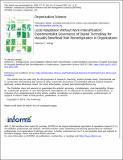Local Adaptation Without Work Intensification: Experimentalist Governance of Digital Technology for Mutually Beneficial Role Reconfiguration in Organizations
Author(s)
Kellogg, Katherine C
DownloadPublished version (3.044Mb)
Publisher with Creative Commons License
Publisher with Creative Commons License
Creative Commons Attribution
Terms of use
Metadata
Show full item recordAbstract
<jats:p> This 1.5-year ethnographic study of a U.S. medical center shows that avoiding loss of autonomy and work intensification for less powerful actors during digital technology introduction and integration presents a multisited collective action challenge. I found that technology-related participation problems, threshold problems, and free rider problems may arise during digital technology introduction and integration that enable loss of autonomy and work intensification for less powerful actors. However, the emergence of new triangles of power allows for novel coalitions between less powerful actors and newly powerful third-party actors that can help mitigate this problem. I extend the political science perspective of experimentalist governance to examine how a digital technology-focused, iterative collective action process of local experimentation followed by central revision can facilitate mutually beneficial role reconfiguration during digital technology introduction and integration. In experimentalist governance of digital technology, local units are given discretion to adapt digital technologies to their specific contexts. A central unit composed of diverse actors then reviews progress across local units integrating similar digital technology to negotiate a new shared understanding of mutually beneficial technology-related tasks for each group of actors. The central unit modifies both local routines and the technology itself in response to problems and possibilities revealed by the central revision process, and the cycle repeats. Here, accomplishing mutually beneficial role reconfiguration occurs through an experimentalist, collective action process rather than through a labor-management bargaining process or a professional-led tuning process. </jats:p>
Date issued
2022Department
Sloan School of ManagementJournal
Organization Science
Publisher
Institute for Operations Research and the Management Sciences (INFORMS)
Citation
Kellogg, Katherine C. 2022. "Local Adaptation Without Work Intensification: Experimentalist Governance of Digital Technology for Mutually Beneficial Role Reconfiguration in Organizations." Organization Science, 33 (2).
Version: Final published version